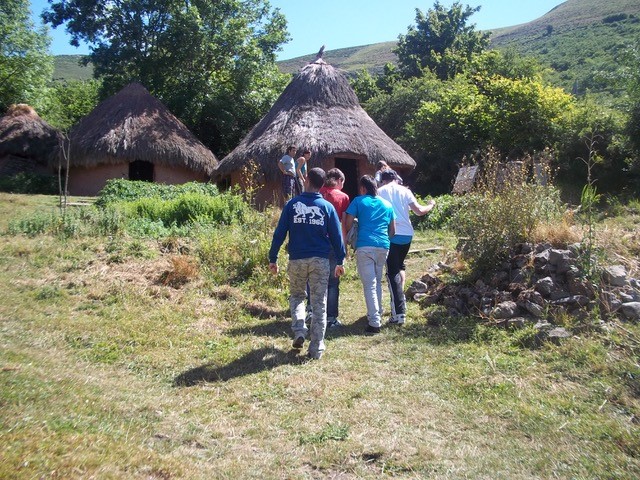- Through the 'Santander Ayuda' programme, the Horuelo Association, the Cuin Foundation and the Acrescere Foundation will offer activities in the non-school period for children and adolescents from vulnerable families.
- According to the INE's Living Conditions Survey, 28.7% of children under 16 are at risk of poverty, and 8.3% of families cannot afford to go on holiday for at least one week a year.
- The opportunity to access healthy leisure activities contributes to the development of children and adolescents and allows them to acquire knowledge and tools outside the classroom, as well as favouring job placement for minors under guardianship.
Madrid, 6 June 2023 - PRESS RELEASE
Spain is the country with the third highest child poverty in the EU behind Greece and Bulgaria, according to Eurostat data. Additionally, as reflected in the latest INE Living Conditions Survey, 28.7% of children under the age of 16 are at risk of poverty. The end of the school year is a problem for vulnerable families in terms of reconciliation. Public places are very limited and the price of private camps is unaffordable.
However, leaving aside the economic difficulty, we must also consider the impact of not being able to access leisure activities for children, which are essential for their development. According to the same report, 8.3% of families cannot afford to go on holiday for even one week a year.
The Banco Santander Foundation, through its 'Santander Ayuda' programme, collaborates with Asociación Horuelo, Fundación Cuin and Fundación Acrescere in summer camps and leisure and free time activities for children and young people in vulnerable situations.
The 'Campamento Avivar’ of the Horuelo Association is a project that has been running for more than 15 years in the San Blas-Canillejas district of Madrid. They have 100 places for children to enjoy a space for leisure and free time that their families cannot afford, favouring the development of social skills.
"The end of the school year is coming, and many families must continue working. It is difficult to reconcile work and family life while our children are on holiday. Many families don't have enough resources to offer their children leisure and recreation plans while the schools are closed until September", explains Ana de Julián, coordinator of Asociación Horuelo.
One aspect worth highlighting is that Horuelo has a group of volunteer mentors (16-17 years old), who have themselves been minors who have participated in the 'Avivar' programme. This project also helps these young people in their learning process and personal development by participating in the camp as interns training as monitors.
This summer camp will take place in Castellón. For Ana de Julián, it is important that children and adolescents have the opportunity to "undergo new experiences such as sleeping outdoors or visiting the seaside and bathing in the sea for the first time. These initiatives promote the development of life skills in children and support families in vulnerable situations or at risk of exclusion, offering an alternative to the holiday period".
In Cantabria, Fundación Cuin offers socio-educational and recreational activities linked to Cantabrian heritage, history, and culture through the programme 'The Legacy of Corocotta' for the children in its homes and shelters.
"This programme has become an excellent pedagogical tool for the summer season that allows us to continue our socio-educational work through leisure and recreational activities that favour the personal and social development of boys and girls," explains Pedro Tresgallo, director of the Foundation. "Through this programme we seek to increase the sense of belonging, as well as to promote knowledge and interest in the geography and historical, artistic and cultural heritage of the Cantabrian region".
‘El legado de Corocotta', which began in 2009, runs from June to September, covering the entire non-school period. In addition to the obvious benefits for the children, it also fulfils a task of integration, by making society aware of the reality of groups in a vulnerable family and personal situation.
"Thanks to Santander Ayuda we can offer these summer activities to 100 young people who live in our CUIN foster homes, boys and girls who are temporarily forced to live away from home because they are homeless or at risk," Tresgallo concludes.
One of the major shortcomings of children living in residential care centres is the lack of complementary activities besides academic ones. The children are forced to spend most of their time inside the residence where they live. For the past 10 years, Fundación Acrescere, through its programme for training, leisure, and recreation (FOTL), has been ensuring that children in care can enjoy a varied and healthy range of leisure activities.
"Many people do not imagine that children living in shelters, over 1,500 in the Community of Madrid alone, lack opportunities for leisure and health related activities," according to Olga Mollá, coordinator of the FOTL programme. "At Fundacion Acrescere we firmly believe in the need to enjoy leisure and play for comprehensive development. Within the same project we have a recreational school that trains monitors with a special perspective and empathy towards working with children who are at risk of exclusion".
The FOTL programme includes weekend activities in the shelters, and urban camps during Easter and Christmas, in addition to the summer camp with overnight stay. A total of 485 minors living in shelters in the Community of Madrid participate in the programme.
These activities are made possible thanks to the work of volunteers like Verónica Sarrabayrouse. For her, "participating as a volunteer in the programme has been an incredible experience. I have participated in several outings and each time, I appreciate the happiness of the children, the relationship that begins to form between the children and the volunteers, and their excitement. The children begin to feel a sense of belonging and of being important to someone. Without this programme, many of these children would not have this incredible opportunity".
Acrescere Foundation has also observed that the programme has benefits for the community. Participating in the camps and activities favours the integration of minors into society, and when they turn 18 and leave the guardian system, their incorporation into the workforce is much easier.


